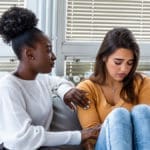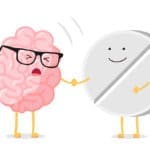When suffering from depression, many people look for treatments that may help curb the effects of the illness. About a third of people struggling with depression do not respond well to current antidepressant medications. Recently, there has been lots of research done around the use of NSAIDs, or non-steroidal anti-inflammatory drugs, for the treatment of depression. Some common NSAIDs are ibuprofen, naproxen, diclofenac, celecoxib, mefenamic acid, etoricoxib, indomethacin, and aspirin.
This research is popular because NSAIDs are widely available and affordable. If NSAIDs are proven to have a significant, positive impact on individuals with major depressive disorders, it could be life changing information for those who have not responded well to standard antidepressant and psychotherapeutic treatments. However, it is important to note that this research has not received a scientific consensus quite yet, so please consult with a psychiatrist before using NSAIDs for depression.
The rest of this blog will help you understand more about the potential benefits and risks of using NSAIDs for the treatment of depression, as well as some of the other ways people are using alternative treatments for major depressive order, like TMS.
What Does the Research Say?
Inflammation Increases the Risk of Depression
Research has also detailed the relation between inflammation and mood disorders like depression. Studies have consistently associated diseases related to inflammation with an increased risk for mood disorders, in particular depression. Autoimmune diseases, like diabetes type 1 or rheumatoid arthritis, and infectious diseases, like hepatitis and sepsis, have been known to cause significant inflammation in those affected and also found to increase the risk of depression.
One study found that those hospitalized because of an autoimmune disease had an increased risk of 45% for mood disorders. That same study also found that those hospitalized with infections had an increased risk of 62% for mood disorders. Individuals that were hospitalized due to both autoimmune disorders and infections had a 2.35 times increased risk for mood disorders.
Testing NSAIDs on Major Depressive Disorders
A 2019 study published in Acta Psychiatrica Scandinavica analyzed 36 randomized clinical trials involving nearly 10,000 people and found 5 out of 6 anti-inflammatory agents improved antidepressant treatment effects compared with placebo and were superior to antidepressants plus placebo in adults with major depressive disorder. The study also found that, when used as monotherapy, 4 of the 6 anti-inflammatory agents outperformed placebo in improving depression scores.
In 2019, The Journal of Neurology, Neurosurgery, and Psychiatry published research suggesting that taking anti-inflammatory agents or NSAIDs, such as Aspirin or Paracetamol, combined with antidepressants can have strong effects in safely suppressing major depressive disorder. This study was done comparing NSAIDs to placebo drug treatments. The anti-inflammatory agents also included:
- NSAIDs omega 3 fatty acids
- drugs that curb production of inflammatory chemicals (cytokine inhibitors)
- Statins
- Steroids
- antibiotics (minocyclines)
- a drug used to treat sleep disorders (modafinil)
- N-acetyl cysteine, known as NAC
The data showed NSAIDs were 52% more effective in reducing the severity of major depressive symptoms, and 72% more effective in the elimination of major depressive symptoms. A more in depth analysis indicated that NSAIDs, omega 3 fatty acids, statins, and minocyclines were the most effective at reducing major depressive symptoms compared with a placebo.
The Risks of NSAIDs for the Treatment of Depression
There are some risks involved with using NSAIDs for the treatment of depression, as they are with any medical treatment. For example, there is a risk for infections with anticytokine treatments.
Should You Use NSAIDs for the Treatment of Depression?
So, should you use NSAIDs for the treatment of depression? The research suggests that when used safely, NSAIDs may have a significant effect on the symptoms of major depression. However, it is important to consult with a licensed therapist and psychiatrist before using any medications as an antidepressant, especially if you are already taking an antidepressant. As none of these anti-inflammatory treatments are approved by the FDA, if used, their use should be reserved for patients in whom FDA-approved treatments are either ineffective or impractical.
At MidCity TMS, we specialize in transcranial magnetic stimulation, or TMS, which is an FDA-approved treatment for depression. TMS is a non-invasive, electromagnetic treatment aimed at individuals struggling with depression who have not responded well to typical antidepressants or psychotherapy.
Contact Mid City TMS for Depression Treatment
If you’re struggling with depression, Mid City TMS can help. Mid City TMS is a New York TMS center that provides transcranial magnetic stimulation as a part of our comprehensive depression treatments. Learn more about what TMS treatment feels like here, and please contact us with any questions. If you’re interested in starting treatment, make an appointment today!



